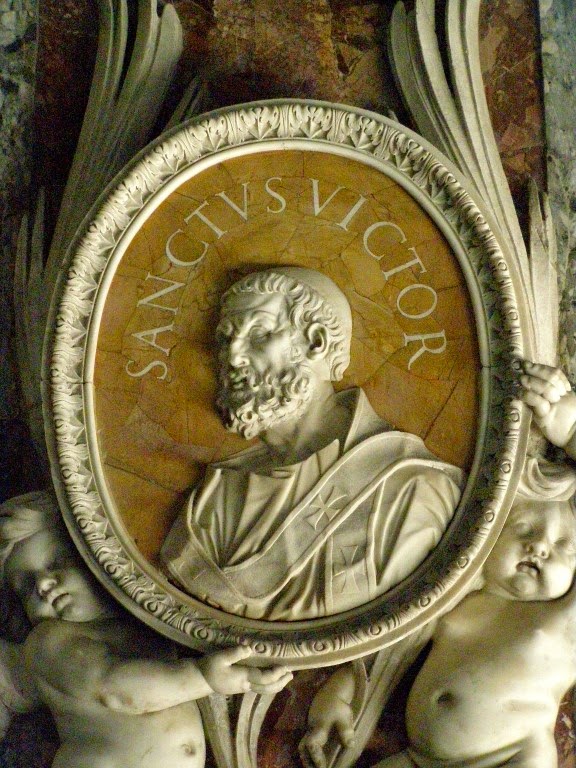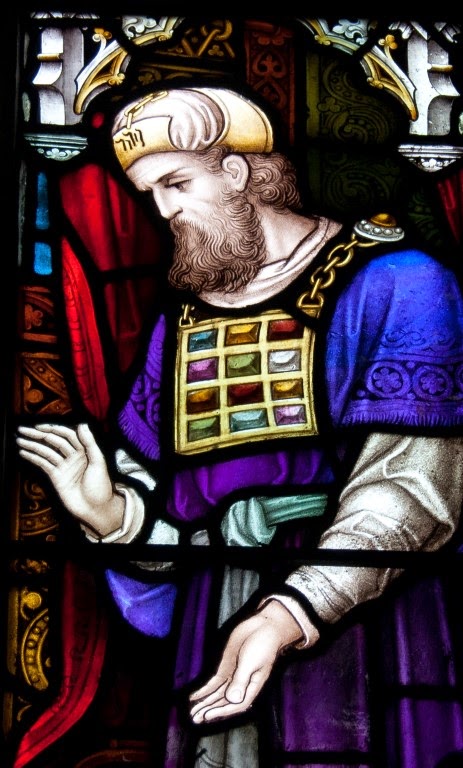 |
| Pope St. Victor I |
In October, I wrote about a fascinating conflict in the first-century church of Corinth. When a dispute broke out within their church, they wrote to Rome. Pope Clement wrote back, issued some orders, and resolved the dispute. Under any circumstances, this would be interesting, because it shows the way that papal authority worked in the primitive Church. But this is all the more telling in that all of this happened while the Apostle John was still alive.
Today, I want to share an epilogue, of sorts, to that story. About a century after Clement intervened in Corinth, we find the papacy once again involved in Asia Minor. The pope was St. Victor, who reigned from 189-99. The controversy was primarily a liturgical one. The various parts of the early Church had different liturgical calendars for Easter, and different Lenten periods of fasting prior to Easter.
At the heart of the dispute was this: in Asia Minor, in those churches dating back to the Apostle John, Easter was celebrated on the 14th of Nisan, the date of the Jewish Passover. Most of the Church rejected this Passover Easter practice, since it meant Easter was frequently on a weekday. They always celebrated Easter on the Lord’s Day, Sunday, even if it meant it didn’t sync up with the Jewish calendar.
Several popes tolerated these contrary liturgical practices, since each practice traced back to at least one Apostle. Pope Victor took a different course, deciding to unify the entire Church’s Easter calendar. He ordered the Asian churches to abandon their old practice in favor of the Easter Sunday dating. They refused. The Church historian Eusebius records their response, written by a bishop named Polycrates. Their basis for refusal is that this was the unbroken practice of the Apostle John, St. Polycarp, and others.
The letter has a few interesting characteristics. First, it refers to the Apostle “John, who was both a witness and a teacher, who reclined upon the bosom of the Lord, and, being a priest, wore the sacerdotal plate.” If these second-century bishops are to be believed, this means that the Apostle John wore the golden plate of a high priest (Exodus 28:36-38). This gives us a clear indication of the fact the early Church understood their clergy in a sacerdotal way: that is, we have priests, not just pastors.
 |
| Presentation of the Blessed Virgin (detail), Church of the Immaculate Conception, Ballymote, Ireland. The High Priest is wearing the sacerdotal plate on his head. |
Second, the letter answers Pope Victor’s demands by quoting Acts 5:29, “We ought to obey God rather than man.” But that’s St. Peter’s response to the high priest. It’s not the sort of thing you say to someone beneath you. So even in arguing that Victor has exceeded his authority over them, the Asian bishops aren’t really refuting that he has authority there. As Campion says, Pope Victor isn’t treated like a foreign power or an outside meddler.
Third, both sides in the dispute are appealing to Tradition, to chains of unbroken practice from the Apostles down to the present (and since John seems to have instituted a different practice than the other Apostles, both sides of the dispute seem to be right). We have what could be a beautiful story about coexisting liturgical traditions, the embrace of different customs, and the diversity of the Body of Christ. Only that’s not how this story turns out. Instead, it was an ugly clash of obedience and authority on the one hand, with liturgical tradition on the other.
That’s because Pope Victor responded to the Asian bishops’ disobedience with a mass excommunication of those who refuse to switch to Easter Sunday. Other bishops — even ones who agreed with Victor — were, quite reasonably, shocked at the harshness of this punishment. St. Irenaeus (who held to an Easter Sunday date, and a believer in the Roman papacy) was one of the bishops who intervened to ensure that cooler heads prevailed. He pointed out that Pope Anacletus had communed with St. Polycarp, despite their difference on this matter.
It’s not entirely clear (at least to me, and to the sources that I’ve read) what happened to the excommunication after Irenaeus and the other bishops spoke up. Eusebius concludes his account by saying simply:
Thus Irenæus, who truly was well named [Irenaeus’ name comes from the Greek word for peace], became a peacemaker in this matter, exhorting and negotiating in this way in behalf of the peace of the churches. And he conferred by letter about this mooted question, not only with Victor, but also with most of the other rulers of the churches
This leaves open the question of why the question was moot. Was it because Victor recanted the excommunications? Or because the excommunications were there to stay? My hunch is the former, simply because we don’t hear of the excommunications later on, but that’s all it is: a hunch.
In any case, the ultimate outcome of the conflict is striking: Victor won. Asia Minor switched from Passover Easter (a tradition established by the Apostle John!) to Easter Sunday, at the demand of the pope. Within a relatively short period of time, those still holding on to the 14th of Nisan dating have been reduced to an insignificant pocket, and as far as I know, they have since gone extinct.
Now, in a way, this story might affirm Protestant fears about the papacy, given the harshness of Victor’s response, and the Apostolic origins of the Asian liturgical calendar. But it’s worth remembering that this story isn’t from some imperious Renaissance Pope. It’s from one of the early Christian martyr popes, and the whole thing happened before the end of the second century. Literally, it’ll be over a century before we even arrive at the Edict of Milan’s legalization of Christianity, much less anything like the Council of Nicaea. Christians of a certain stripe long for the early days of Christianity, imagining highly-centralized structures like the papacy to be a later development (or invention). But this is early Christianity. The papacy has been at the heart of the Catholic Church from the start, as history shows us with both Pope Clement and Pope Victor.

Joe, excellent as always. Might I add that it is OK to use the word ‘oriental’. We are all grown ups here. Really. It’s alright.
Wow, thanks Joe!
The Eastern interpretation is a little different and goes as follows:
Anacletus insists on Sunday Pascha and Polycarp doesn’t give a damn what Anacletus wants and travels to Rome to tell him he’s an idiot, and ultimately their confrontation ends in stalemate.
Victor then tries his luck threatening excommunication, and this time is “admonished” and “sharply rebuked” by a multitude of other bishops and the threat of excommunication is dropped. I don’t think the issue was really settled there…doesn’t Nicea pick up the pascha date again?
Anyway, fast forward to Cyprian and Stephen fighting on baptism. Cyprian ignores Stephen, and says in rebuttal to his claim of the ancient custom of interfering in other dioceses “Custom without truth is the antiquity of error.”
Yes, the papal claims are as old as the Church…but so is the resistance to those claims.
From solely the historical perspective, and not the theological, the issue is unclear.
Daniel,
Of course the Eastern interpretation is different! But conflicting interpretations of facts don’t mean the facts are in conflict. There are simply no records of people resisting “papal claims”; but there *are* many records, as you mention, of people resisting *popes.* That is easy to harmonize with the Catholic account. And in every case, one may note, the popes prevailed in the end. (Of course, I’m by no means trying to settle the question in a blog comment!)
Joe,
The primary (and technically correct) meaning of “mooted” is “subject to debate, dispute.” That’s probably the meaning used in the translation from Eusebius.
Reuben
“There are simply no records of people resisting “papal claims”…And in every case, one may note, the popes prevailed in the end.”
Please don’t embarrass yourself.
Please don’t give me any concrete reasons to think I did! 🙂
But as I said, I’m not trying to resolve the Great Schism in a blog’s combox. That being said, I stand by my claim that there are no extant records from the early centuries of people we would recognize today as wholly orthodox disputing theological claims of a papal primacy instituted by Christ, nor are there any examples of popes reversing authoritative doctrinal decisions after encountering “pushback.” I admit I *could* be mistaken about the first point, and I admit there are probably examples of popes reversing policy, disciplinary, etc. decisions after “pushback.”
Reuben
Two sentences from Eusebius is the closest thing we get to a contemporary account. Often how people summarize history is very different than how history explains itself.